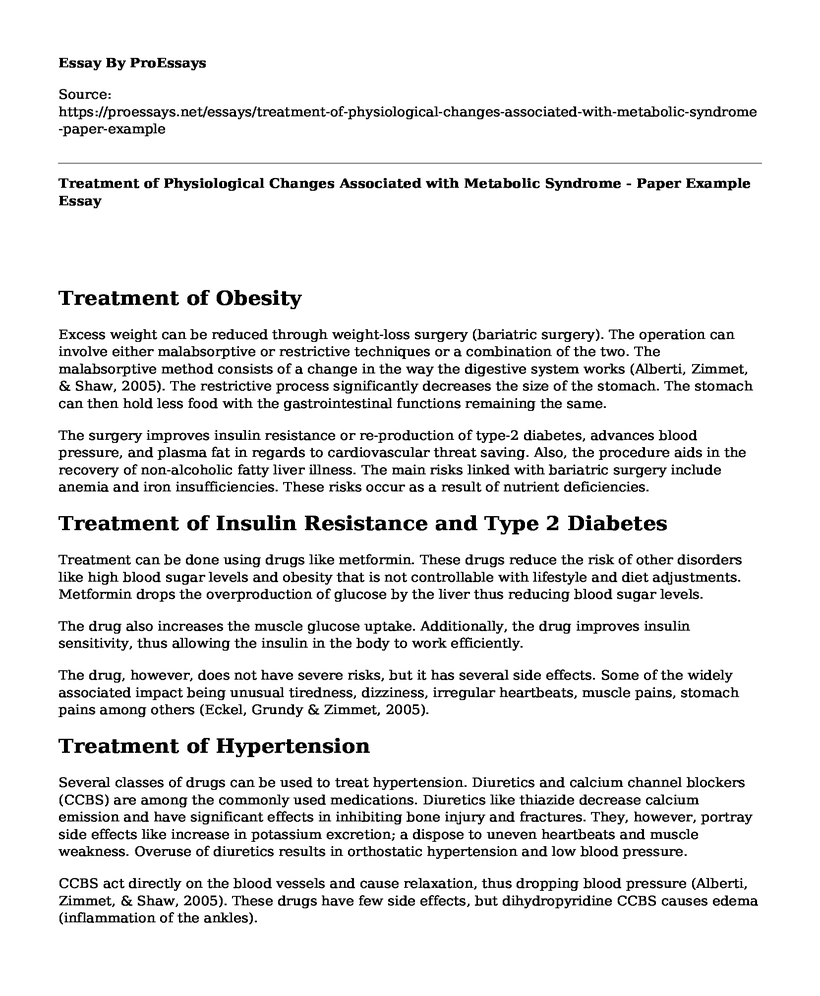Treatment of Obesity
Excess weight can be reduced through weight-loss surgery (bariatric surgery). The operation can involve either malabsorptive or restrictive techniques or a combination of the two. The malabsorptive method consists of a change in the way the digestive system works (Alberti, Zimmet, & Shaw, 2005). The restrictive process significantly decreases the size of the stomach. The stomach can then hold less food with the gastrointestinal functions remaining the same.
The surgery improves insulin resistance or re-production of type-2 diabetes, advances blood pressure, and plasma fat in regards to cardiovascular threat saving. Also, the procedure aids in the recovery of non-alcoholic fatty liver illness. The main risks linked with bariatric surgery include anemia and iron insufficiencies. These risks occur as a result of nutrient deficiencies.
Treatment of Insulin Resistance and Type 2 Diabetes
Treatment can be done using drugs like metformin. These drugs reduce the risk of other disorders like high blood sugar levels and obesity that is not controllable with lifestyle and diet adjustments. Metformin drops the overproduction of glucose by the liver thus reducing blood sugar levels.
The drug also increases the muscle glucose uptake. Additionally, the drug improves insulin sensitivity, thus allowing the insulin in the body to work efficiently.
The drug, however, does not have severe risks, but it has several side effects. Some of the widely associated impact being unusual tiredness, dizziness, irregular heartbeats, muscle pains, stomach pains among others (Eckel, Grundy & Zimmet, 2005).
Treatment of Hypertension
Several classes of drugs can be used to treat hypertension. Diuretics and calcium channel blockers (CCBS) are among the commonly used medications. Diuretics like thiazide decrease calcium emission and have significant effects in inhibiting bone injury and fractures. They, however, portray side effects like increase in potassium excretion; a dispose to uneven heartbeats and muscle weakness. Overuse of diuretics results in orthostatic hypertension and low blood pressure.
CCBS act directly on the blood vessels and cause relaxation, thus dropping blood pressure (Alberti, Zimmet, & Shaw, 2005). These drugs have few side effects, but dihydropyridine CCBS causes edema (inflammation of the ankles).
Treatment of Dyslipidemia
Dyslipidemia can be treated with various drugs, but statins are the commonly used. Statins reduce the low-density lipoprotein cholesterol (LDL-Cholesterol) levels (Eckel, Grundy & Zimmet, 2005). However, these drugs may not attain the LDL-cholesterol levels required thus prompting for other cholesterol lowering therapies.
Genetics Impact on Metabolic Syndrome
People who develop obesity in other ways rather than the commonly known manner have insulin resistance and have abnormal levels of metabolic risk factors. For instance in persons with two or one diabetic parent. It is probable that the manifestation of each metabolic risk feature is influenced by a specific genetic factor (Kaur, 2014). This genetic aspect affects the response of an individual to different surroundings. For example, a kind of polymorphisms in genes that influence lipoprotein metabolism causes severe dyslipidemia amongst obese individuals.
Conferring to the thrifty genotype hypothesis, persons staying in harsh environs with an insecure food supply would exploit their survival if they could maximise their energy supply. Genetic selection would, therefore, favor the energy conserving genotypes in such surroundings. But, the genetic variations preferred in the course of malnutrition would become unfavorable once nutrition supply increased. The hypothesis consents that the standard genetic alternatives of thrifty genes predispose metabolic syndrome.
Dangers Involved in Leftover Medication and How a Public Health Nurse Can Educate the Public About These Dangers
Leftover medicines pose several risks to people, animals, and the environment (Ceaser & Wurtz, 2000). Drug abuse and overdose may be experienced among teenagers as a result of unused meds. On the other hand, accidental poisonings among young children or pets may be encountered. Additionally, these drugs would result in environmental hazards through water contamination. Water contamination would lead to polluted water supplies in homes and also affect the aquatic life.
To prevent this risks, medical experts should advice the community on the appropriate ways of disposing of unused drugs. They could probably conduct healthcare programs to sensitise people on the dangers of leftover medicines or develop drug take-back programs.
References
Alberti, K. G. M., Zimmet, P., & Shaw, J. (2005). The metabolic syndrome-a new worldwide definition. The Lancet, 366(9491), 1059-1062.
Ceaser, S., & Wurtz, R. (2000). " Leftover" antibiotics in the medicine cabinet. Annals of internal medicine, 133(1), 74.
Eckel, R. H., Grundy, S. M., & Zimmet, P. Z. (2005). The metabolic syndrome. The lancet, 365(9468), 1415-1428.
Kaur, J. (2014). A comprehensive review on metabolic syndrome. Cardiology research and practice, 2014.
Cite this page
Treatment of Physiological Changes Associated with Metabolic Syndrome - Paper Example. (2022, Jul 16). Retrieved from https://proessays.net/essays/treatment-of-physiological-changes-associated-with-metabolic-syndrome-paper-example
If you are the original author of this essay and no longer wish to have it published on the ProEssays website, please click below to request its removal:
- Advocate for Increased Physical Activity In the Global Arena
- Essay Sample on Mental Disorders
- The Key to Success: Essay Sample on Self-Belief and Courage
- Essay on Value of Critical Thinking in the Nursing Profession
- Essay Example on American Red Cross: Helping People in Need
- Essay on My Objectivist Beliefs: How Self-Interest, Reason, Capitalism, and Reality Unify
- Paper Example on Behavioral Finance: Combining Theory with Investment Options







